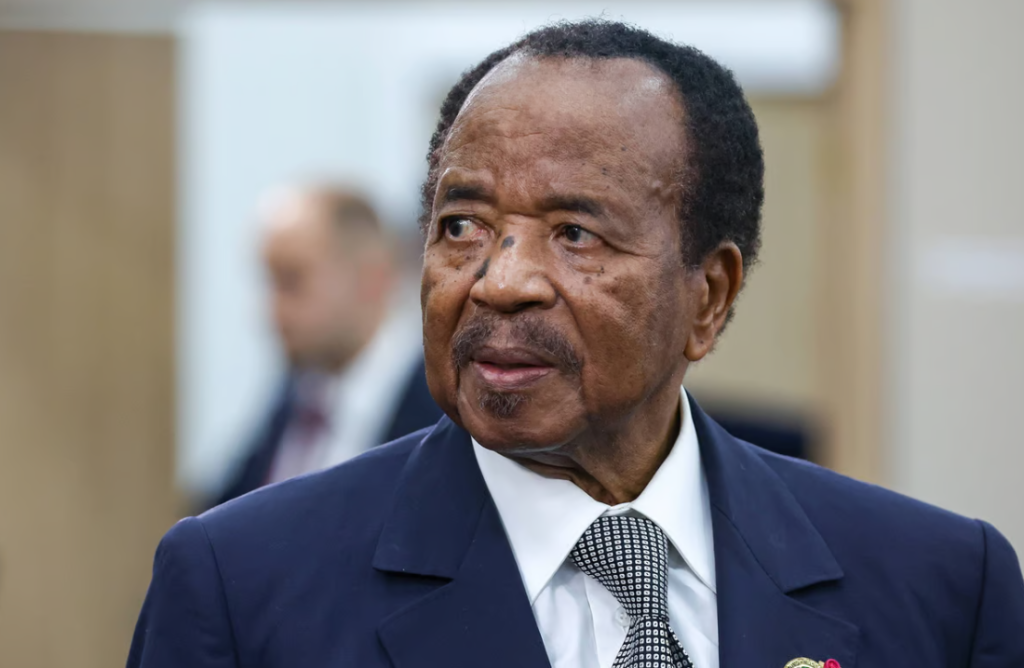
Raphael Kanu
Cameroon’s long-serving leader, President Paul Biya, has been declared the winner of the country’s presidential election, securing 53.7 per cent of the vote to clinch a controversial eighth consecutive term in office. The announcement by the Constitutional Council has sparked unrest in several cities, with opposition groups denouncing the result as fraudulent.
At 92 years old, Biya retains his position as the world’s oldest serving head of state, extending his rule to at least 2032, fifty years since he first assumed office in 1982. His main challenger, Issa Tchiroma Bakary, who once served under Biya before breaking away from his government, came second with 35.19 per cent of the vote. Tchiroma had earlier declared himself the rightful winner, accusing the government of stealing the people’s mandate through widespread electoral manipulation and intimidation.
Tensions flared shortly after the results were announced as violent clashes erupted between protesters and security forces in several parts of the country, including Douala, Cameroon’s commercial hub, and Garoua, Tchiroma’s northern stronghold. Authorities confirmed that at least four people were killed during the confrontations. In Bamenda, the capital of the restive English-speaking North-West region, the streets were largely deserted as residents remained indoors, fearing military crackdowns. Security forces were heavily deployed across major junctions to maintain calm during what locals refer to as “Kontri Sunday” or “ghost town,” a day marked by solidarity and mourning for victims of the ongoing Anglophone conflict.
Eyewitnesses in Garoua said hundreds of opposition supporters defied a government ban on public gatherings, marching through the streets with placards demanding that their votes be respected. Security agents fired tear gas to disperse the demonstrators, while several opposition leaders were reportedly arrested. Analysts have warned that the disputed outcome could push the Central African nation further toward political instability, as the opposition continues to insist that the election was marred by irregularities, intimidation and ballot stuffing. The government, however, maintains that the process was free and fair.
Clément Atangana, head of the Constitutional Council, described the election as peaceful and criticised candidates who declared themselves winners before the official announcement. He reminded the public that complaints should only be lodged through formal petitions, noting that ten such petitions had already been dismissed for lack of evidence. Meanwhile, Cameroon’s internet connectivity has been disrupted over the past few days. Internet monitoring organisation NetBlocks reported widespread connectivity problems that could hinder coverage of unfolding events. The state telecommunications company, Camtel, attributed the outage to a technical incident, though opposition figures claim it was a deliberate attempt to suppress dissent and restrict access to information.
While Biya dominated the polls within Cameroon, the country’s diaspora overwhelmingly backed his opponent. Across Africa, 54.99 per cent of overseas voters supported Tchiroma; in the Americas, 66.75 per cent; in Asia and the Middle East, 68.21 per cent; and in Europe, 62.79 per cent. Despite this, the diaspora vote was insufficient to offset Biya’s sweeping home advantage, particularly in his native South region, where he recorded an overwhelming 90.86 per cent of the vote.
The result underscores Cameroon’s deep generational divide. More than 60 per cent of its 30 million citizens are under the age of 25, meaning most have known no other leader but Paul Biya. Yet youth unemployment remains alarmingly high, with almost 40 per cent of people aged 15 to 35 jobless or underemployed. Many young Cameroonians see migration as the only path to a better future. “Inside the country, they don’t believe they can become somebody,” said 26-year-old graduate Vanina Nzekui, who spoke to the BBC before the election. “All the key positions are occupied by older people.”
Despite growing criticism, Biya made only one campaign appearance before the vote, telling supporters that “the best is still to come.” His ruling Cameroon People’s Democratic Movement dismissed allegations of vote-rigging as baseless and congratulated citizens for what it called a peaceful and democratic process. However, the atmosphere across Cameroon remains tense, with heavy security presence in major cities, continuing arrests of opposition figures, and renewed calls for mass demonstrations.
If President Biya completes his new seven-year term, he will be nearing 100 years old by the time it ends — a milestone that cements his status not only as Africa’s oldest leader but also as one of the longest-serving presidents in modern history.
